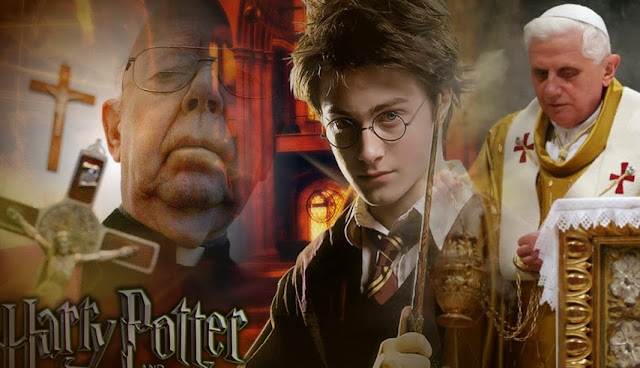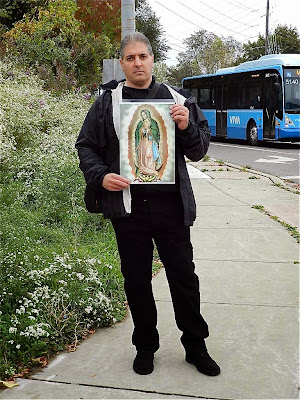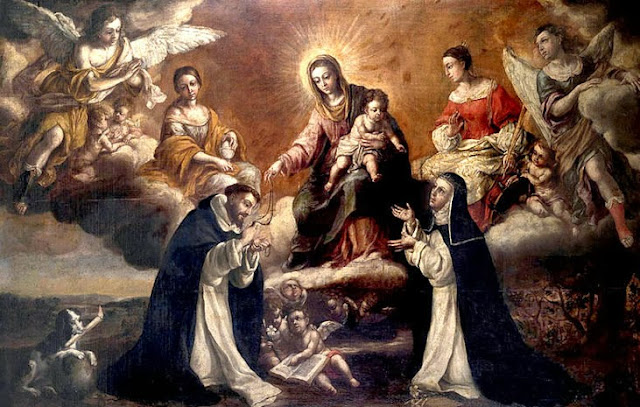 |
| Carved out pumpkins into "Jack O' Lanterns" a Halloween custom |
Here in Canada in a couple days time, much of the focus on October 31, will be on Halloween, a pagan custom dating back to many centuries. I thought it fitting to publish on this topic and spread awareness of the truth about its anti-Christian character. Today's post not only provides a short summary of the history and origins of Halloween, but shifts the attention to the proper focus for this time of year, the feasts of All Saints and the Commemoration of the Faithful Departed or All Souls Day.
It is interesting to note that here in my local community, one that is predominantly Roman Catholic, there appears to be very little knowledge and understanding of the origins of this pagan custom, and the potentially dangerous spiritual ramifications; that is, the demonic influence—that is unseen and undetected by most people—that may result from any participation in Halloween.
For several days now, part of Woodbridge has been immersed in the preparation for Halloween. Parents have purchased costumes for their young children and subsequently adjusted their calendars to allow for chaperoning during "trick or treating." Displays in grocery stores have a clear Halloween theme to them, not to mention the recently arrived Halloween treats and other items. I even caught a poster at a stop light, advertising a Halloween party. Then there is the bombardment of Halloween movies on the television, that have been available for viewing well in advance of October 31. This is but a partial list of many other things that are well underway, all done to usher in this pagan custom.
Having witnessed all this for three decades now, I can't help but wonder, how seriously do parents take Halloween. Do they know the truth about it. It is my impression that a significant amount (an overwhelming majority) of residents do not know the truth about Halloween; a sad reality that is undoubtedly mirrored in many other Catholic communities in Canada and throughout the world.
I think that to some extent the general lack of concern stems from the fact that so many people are involved and participate in Halloween, that in the eyes of many (who have never questioned it), it is considered to be totally acceptable.
It has been my experience that too many Catholics and Christians alike, have become desensitized to the dangers of Halloween, and when confronted by the truth, they tend to personalize the issue. In my conversations with such individuals, many have stated that "Halloween is fun for kids," or referred to their own childhood experiences, all which does not negate the truth about Halloween.
My post of today seeks to remedy the need for a greater awareness and understanding about the truth of Halloween.
A Brief History of the Origins of Halloween
Where does Halloween come from and what is it based on. Halloween is based on the Celtic customs of the ancient peoples who inhabited England, Wales, Scotland, Ireland and Brittany (north western France). Prior to these regions converting to Catholicism, the people that inhabited them practiced a pagan belief system controlled by a priest class known as Druids. Druids are most famous for the Stonehenge monument, located in Wiltshire, England.
The Celtic new year was November 1, and according to their pagan beliefs, it was a time to consider the mystery of human death. It is believed that the lord of death, Samhain, on the last night of the year would allow the souls of the dead to return to their homes. The souls that died in sin, imprisoned in the bodies of animals, could be released through gifts to Samhain, including human sacrifices.
In addition, they believed that evil spirits, demons, ghosts, witches were free to roam during the last night of the year and they could be appeased with a feast and by dressing up to appear to be one of them. When the Romans conquered Gaul (France) and much of the United Kingdom, the bloody elements of Druidic practices were banned.
The Proper Christian Focus
During the first three centuries of Christianity, the Church faced a great deal of persecutions which forced the Church to operate underground. It was not long before a need developed to commemorate the many number of martyrs. To have set aside a dedicated feast day for each martyr was not possible under the Roman emperors' persecution. In response to all this, the Church established a common feast for all martyrs. Pope Gregory III (731-741) on November 1 commemorated a feast for All Saints at St. Peter's Basilica. Pope Gregory VI (827-844) extended this feast to the entire Church.
Over the centuries, the conversion of Celtic peoples did not completely remove some of their pre-Christian feasts, bonfires, and dressing up in costumes and other pagan practices. These were brought to North America with the massive Irish immigration in the twentieth century.
Over the last few decades, the decline of the Catholic faith has made it easier for people to accept and adopt these pre-Christian traditions. No doubt, this is partly due to a lack of knowledge and if you factor in the major promotional efforts at this time every year, it is not difficult to see how Halloween has become apart of Canadian mainstream culture.
Should we not be concerned about such customs, especially when we know the truth about their origins and the meaning of their practices. Do we want to promote and encourage our children to dress up like evil spirits, witches, ghosts and other occult figures. What message are we giving to our children. Do we not to some extent, encourage a process of desensitization to the occult and by so doing, increase the risks that as older people, they may be more susceptible to and get involved in real life dangerous occult activity.
The truth about Halloween is this: it is a pagan custom that is not compatible with the Catholic faith. Pagan worship is a worship of false gods or demons. Catholic worship is a worship of the true God, whose sacrifice on the cross at Calvary proved His total and complete love for us. In the Catechism of the Catholic Church, it states regarding the worship of false Gods under the section "YOU SHALL HAVE NO OTHER GODS BEFORE ME, The first commandment forbids honouring gods other than the one Lord who has revealed himself to his people..." (2109)
In my view, anyone acting in good conscience and having knowledge of the origins of Halloween, should not participate in this custom. At this time of the liturgical year, the Catholic faith places emphasis on the liturgical calendar's solemnity of the Feast of All Saints on November 1, and the Commemoration of all the Faithful Departed or All Souls, on November 2.
Feasts of All Saints and All Souls
The end of October in the liturgical calendar of the Catholic Church, marks a month long effort by conscientious Catholics to better their relationship with the Blessed Virgin Mary and improve upon the Rosary Devotion. It is also a time to prepare for the feasts of All Saints (November 1) and All Souls (November 2).
To illustrate the importance of the proper focus for this time of the year, I would like to share excerpts of two meditations from Divine Intimacy, Meditations on The Interior Life For Every Day of The Liturgical Year. This classic book of Carmelite Spirituality includes a dedicated meditation; one for All Saints and one for All Souls. This wonderful treasure of spirituality does not contain any meditation on or make any reference to Halloween. I reiterate the point, Halloween is not a Catholic custom and as such, is not apart of the liturgical calendar. Below are excerpts from Divine Intimacy that will give you a glimpse of how valuable this book is and the importance of the proper focus:
- Feast of All Saints, Meditation 384: Holy Mother Church, always solicitous and anxious for our salvation, exults today with exceeding joy as she contemplates the glory of her children who, having reached their heavenly fatherland, are safe for all eternity, forever delivered from the snares of the evil one, and now numbered everlastingly among the elect, the people of God...Who are these glorious saints? Men who have lived upon earth as we have, who have known our miseries, our difficulties, our struggles...We want to become saints, but in the easiest way possible, without effort, without fatigue or violence to ourselves...[W]hen faced with acts of virtue which exact greater self renunciation, or the acceptance of difficulty and repugnant things...we refuse, thinking it unnecessary to go to such lengths. Yet our progress in holiness depends precisely upon these acts which we hesitate to make; without them we shall always lead a mediocre life, we shall always remain on the same level, if indeed we do not lose ground. Let us beg the saints whom we honor today to help us overcome our laziness, our lassitude, our cowardice...God offers us the grace which He gave to the saints; but alas! what is lacking is our correspondence with it. (1166)
- Commemoration of All The Faithful Departed (All Souls), Meditation 385: Holy Church, our good Mother, after having exalted with fitting praise all her children who now rejoice in heaven, strives also to help all those who still suffer in purgatory, and to this end intercedes with all her power before Christ, her Lord and Spouse, in order that as speedily as possible they may join the society of the elect in heaven...Yesterday we contemplated the glory of the Church triumphant and implored her intercession. Today we consider the expiratory pains of the Church suffering and solicit for those souls the divine assistance: 'Eternal rest grant unto them, O Lord'... (1167)
The sad reality is that Halloween will not cease because of this blog post. If you have accepted the truth about Halloween and would like to do something about it, I encourage you to share this post with others.
Lastly, I would like to respectfully recommend that when children arrive at your door, that you give them a Rosary in place of any treat. This is a simple and charitable way of telling your neighours that Halloween is inappropriate.
May God bless all those who come to your door on October 31.








